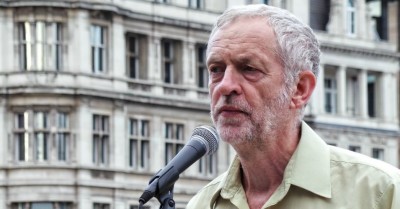Getting Jeremy Corbyn: The Assault Begins

Barely has the dust settled, and the knives are out for the new leader of the British Labour Party. This is complicated by the fact that Jeremy Corbyn is effectively waging two battles: one within his own party, riddled with technocratic scepticism; and those from without, who see a form of capitalised calamity in the wings.
Papers are running updates about the attempts by Corbyn to appoint a shadow cabinet. Each statement from the next evacuee from the boat is given full coverage, suggesting a catastrophic outbreak of influenza. (At this writing, Chuka Umunna is noted inThe Telegraph as being “the highest-profile figure to quit the shadow cabinet” showing form in having quit the race for the leadership to begin with.)
Labour does have a good deal of bleeding to do, notably on the old Blairite issues that changed the party into a Thatcherite coven of pro-marketeers and evangelical war mongers. It is going to prove traumatic, as any ideological reconditioning tends to be.
There is the old ego set, lingering notions centred on national security, which have to be confronted. The nuclear deterrent Trident remains the enormous, erroneous phallus of the security establishment, an illusion of power from what is essentially an unquestioned extension of US power.
Tom Watson, the deputy leader, still clings to the Trident phallus with unquestioning conviction. It is becoming a sticking point between him and Corbyn – will it be renewed? Many of the union leaders think it should, and Watson is pressing Corbyn on the subject of getting reassurance. But Corbyn never had much time for the beast, and has made it part of his manifesto of change, suggesting that Trident be replaced by jobs that retain the skills of the workers.
Then come the meaty issues of continued membership of the European Union and NATO. Watson insists that the British role in the EU is unquestioned, though his reasons for doing so have little to do with the spirit of federalism so much as trade. Umunna’s own decision to quit the front bench was largely put down to Corbyn’s refusal to be “unambiguous” about continued British membership.
Umunna’s statement on the subject, after proclaiming an interest in building “a more equal, democratic, free and fair society” was to sink his boot into the very idea that a democratic outcome in a referendum on the EU should necessarily be abided by. “It is my view that we should support the UK remaining a member of the EU, notwithstanding the outcome of any renegotiation by the prime minister”.
This has been the continued theme of the evacuees: we all share a vision about the equal and democratic society, and acknowledge the mandate of Corbyn’s leadership win. That said, we will oppose him at every main juncture, at every point upon which that mandate was secured. And avoid, at all relevant points, discussing the anti-austerity, social welfare reforms that are on the table.
There have also been very blatant attempts at blackmail. Labour’s biggest private donor, John Mills, has made a public stance on the issue of funding MPs keen to sabotage Corbyn’s leadership while withdrawing all direct funding to the party proper. The fresh breeze is set to be stifled.
From without, the Prime Minister has not wasted any time. The Trade Union Bill on the table has one vital object: limiting the means the unions have for calling strikes. A four-month limit on ballots for industrial action is being proposed as part of the reforms. Such measures have been red rags to the bulls within the union movement.
The conservatives have, to that end, served to highlight the support for Corbyn from the unions as the very reason he should be opposed. Britain’s national security will be at stake before an army of left wing fanatics. The marketing team, not wanting to waste any time, released an attack video with the title “Labour: a threat to our national security.”
Leaving decency at the front door, the strategists deploy what theIndependent described as “sinister, unsettling music” featuring “clips of Mr Corbyn filtered in black and white – interspersed with clips of ISIS fighters.”[1] The list of Corbyn goodies include his anti-Trident stance and a remark describing the execution without trial of Osama Bin Laden as a “tragedy”. (The video naturally hints at sympathy for Bin Laden rather than the tragic circumstances of resorting to extrajudicial killing.)
The establishment press is similarly on board the theory of chaos that Corbyn is said to entail. It is also chortling at the party tensions, noting that such disagreements are “a sign that the new leadership may be unable to agree on key policy positions in the weeks ahead.”[2]
For all of that, these are early days. Corbyn as leader may bend a little on some of these stances in time. Debates are bound to be had within the party. But he risks undermining himself without inflicting a well targeted purge of the Blairite technocrats. Thus far, they are doing a good job of it themselves. The looming question remains how far Corbyn, with his seemingly vast broom, can go.
Dr. Binoy Kampmark was a Commonwealth Scholar at Selwyn College, Cambridge. He lectures at RMIT University, Melbourne. Email: [email protected]
Notes

